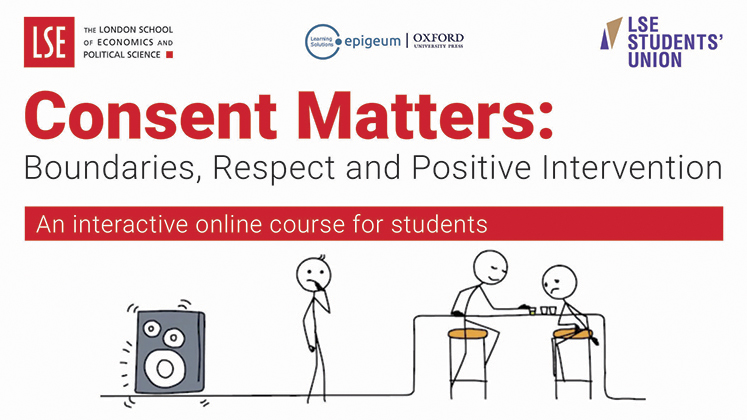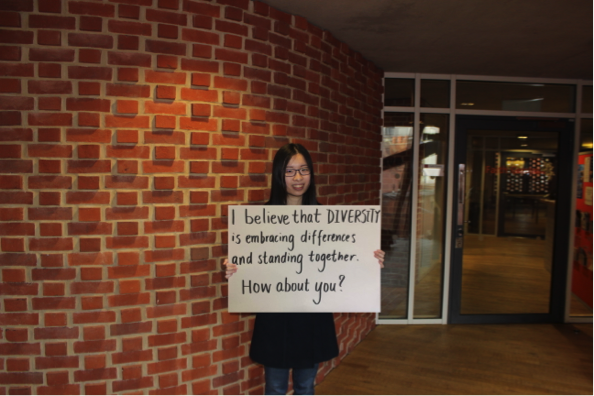In the 2017–18 Michaelmas term, LSE and the LSE Students’ Union (LSESU) are introducing ‘Consent Matters: Boundaries, Respect and Positive Intervention’ – an interactive online course on consent. Natasha Davies – LSESU women’s officer – discusses the overwhelming support for the introduction of the course and its importance in enabling students to deal with real life situations. The course is available to access at lse.ac.uk/consentmatters.
Approximately 85,000 women and 12,000 men are raped in England and Wales alone every year; that’s roughly 11 rapes (of adults alone) every hour.[1] Sexual assault and harassment are also considerably more frequent at universities. For example, an NUS (National Union of Students) survey found that – across the UK – over two thirds (68 per cent) of female respondents have experienced verbal or non-verbal harassment in or around their institution.[2] This behaviour, including groping, flashing and unwanted sexual comments, has become ‘everyday’ for many female students. As well as this appalling scale of harassment and assault, equally troubling are attitudes about it which still clearly illustrate ‘victim blaming’ and ‘slut shaming’. Amnesty has found that one third of people believe that women who flirt are partially responsible for being raped.[3]
Last year LSE students made it clear that enough is enough. After a tremendous amount of effort from students and staff alike, the Students’ Union passed a motion calling for mandatory consent workshops for all first year undergraduates. This was a massive achievement for all involved and the motion became the most voted on UGM (union general meeting) ever at LSESU, showing the enormous levels of support from students. This is something that has been chosen by the student body and is supported by an overwhelming number of people.
However, despite this, mandatory consent courses at universities have been controversial to say the least. One of the loudest criticisms is that consent courses are ‘patronising’ and paint all men as rapists and all women as victims. These criticisms are shallow, ignorant and completely miss the point of consent courses – these courses don’t pit men and women against each other but look at how everyone is affected by issues of consent and how anyone can be a victim and anyone a perpetrator. It is easy to see how sex education in UK schools and elsewhere is deeply lacking – consent and respect are rarely explored and LGBTQ+ issues are often missed out altogether. Consent courses run by students’ unions across the country try to correct this.
The reason we are introducing this course (and why so many students voted to do so) is because consent is a complex issue that can’t be avoided. This course helps people explore a multitude of issues – not just ‘how to not be a rapist’. It helps participants understand how consent works in different situations, explores the importance of body language and communication, debunks some of the common myths surrounding consent and encourages positive bystander intervention. As well as discussing these issues theoretically, the course helps equip students to deal with real life situations – whether they find themselves directly participating in that situation, whether they are a bystander, or if they are supporting a friend who has been abused.
The introduction of consent courses at LSE will not solve all issues – LSE (and other universities) still have a long way to go on issues regarding consent and harassment. Throughout the year, I will be working as women’s officer with people from the Students’ Union and the School to ensure that LSE continues to become a safer place where people are more respectful of each other. This includes working closely with the School and with Solace Women’s Aid to review the School’s policies in this area, making sure the Union’s social places become safer, working with clubs and societies and making support and reporting services more transparent and easily accessible. It also includes ensuring that survivors of sexual assault – who may feel more comfortable not undertaking the consent training – feel fully supported by the School.
The introduction of mandatory consent courses is an incredibly important and significant first step. Not only will it increase everyone’s understanding of the issues and equip people to deal with real life situations more confidently, it also sends a clear message about what will and will not be tolerated at our university.
For further information about the course and details of sources of support, please see lse.ac.uk/consentmatters.
* Natasha Davies is the LSESU women’s officer in 2017–18.
References
[1] https://rapecrisis.org.uk/statistics.php
[2] https://www.nus.org.uk/Global/NUS_hidden_marks_report_2nd_edition_web.pdf
[3] https://rapecrisis.org.uk/statistics.php






